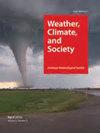What do I know about severe weather? The influence of weather knowledge on protective action decisions.
IF 1.9
4区 地球科学
Q3 ENVIRONMENTAL STUDIES
引用次数: 0
Abstract
Research has found that people who know the least about a topic are often very overconfident of their knowledge, while those who know the most often underestimate their knowledge. This finding, known as the Dunning-Kruger Effect (DKE) has recently been shown to occur in knowledge of severe weather as well. The current study investigated whether being overconfident in one’s knowledge might translate into a tendency to make poorer sheltering decisions when faced with severe weather. Participants took two severe weather quizzes, one of perceived knowledge and one of objective knowledge. Participants also predicted their performance on both quizzes. The participants then saw four wireless emergency tornado warning alerts on a simulated smartphone screen, along with a tornado scenario, and then made two protective action decisions: one about immediately sheltering in place and the other the likelihood they would drive away. The results revealed that the participants did exhibit the DKE: those with the lowest levels of knowledge exhibited the most overconfidence while those with the highest levels of knowledge underestimated their performance. Also, compared to individuals with the most knowledge, those with the least knowledge were the most likely to state that they would not shelter immediately, and would get in their car and drive away. Although more education is needed, the findings suggest a conundrum: those who know the least about severe weather, thinking they know a lot, are likely those individuals least likely to seek out additional education on the topic.我对恶劣天气了解多少?天气知识对保护行动决策的影响。
研究发现,对某个话题了解最少的人往往对自己的知识过于自信,而了解最多的人往往低估了自己的知识。这一发现被称为邓-克鲁格效应(DKE),最近也被证明发生在恶劣天气的知识中。目前的研究调查了在面对恶劣天气时,对自己的知识过于自信是否会转化为做出更糟糕的避难决定的倾向。参与者参加了两次恶劣天气测验,一次是感知知识测验,另一次是客观知识测验。参与者还预测了他们在两次测验中的表现。然后,参与者在模拟智能手机屏幕上看到了四个无线龙卷风紧急警报,以及龙卷风场景,然后做出了两个保护行动决定:一个是立即就地避难,另一个是他们可能会开车离开。结果显示,参与者确实表现出了DKE:那些知识水平最低的人表现出了最大的过度自信,而那些知识水平最高的人低估了他们的表现。此外,与知识最多的人相比,知识最少的人最有可能表示他们不会立即避难,而是会上车开走。尽管还需要更多的教育,但研究结果表明了一个难题:那些对恶劣天气了解最少、认为自己了解很多的人,很可能是那些最不可能寻求额外教育的人。
本文章由计算机程序翻译,如有差异,请以英文原文为准。
求助全文
约1分钟内获得全文
求助全文
来源期刊

Weather Climate and Society
METEOROLOGY & ATMOSPHERIC SCIENCES-
CiteScore
3.40
自引率
13.60%
发文量
95
审稿时长
>12 weeks
期刊介绍:
Weather, Climate, and Society (WCAS) publishes research that encompasses economics, policy analysis, political science, history, and institutional, social, and behavioral scholarship relating to weather and climate, including climate change. Contributions must include original social science research, evidence-based analysis, and relevance to the interactions of weather and climate with society.
 求助内容:
求助内容: 应助结果提醒方式:
应助结果提醒方式:


